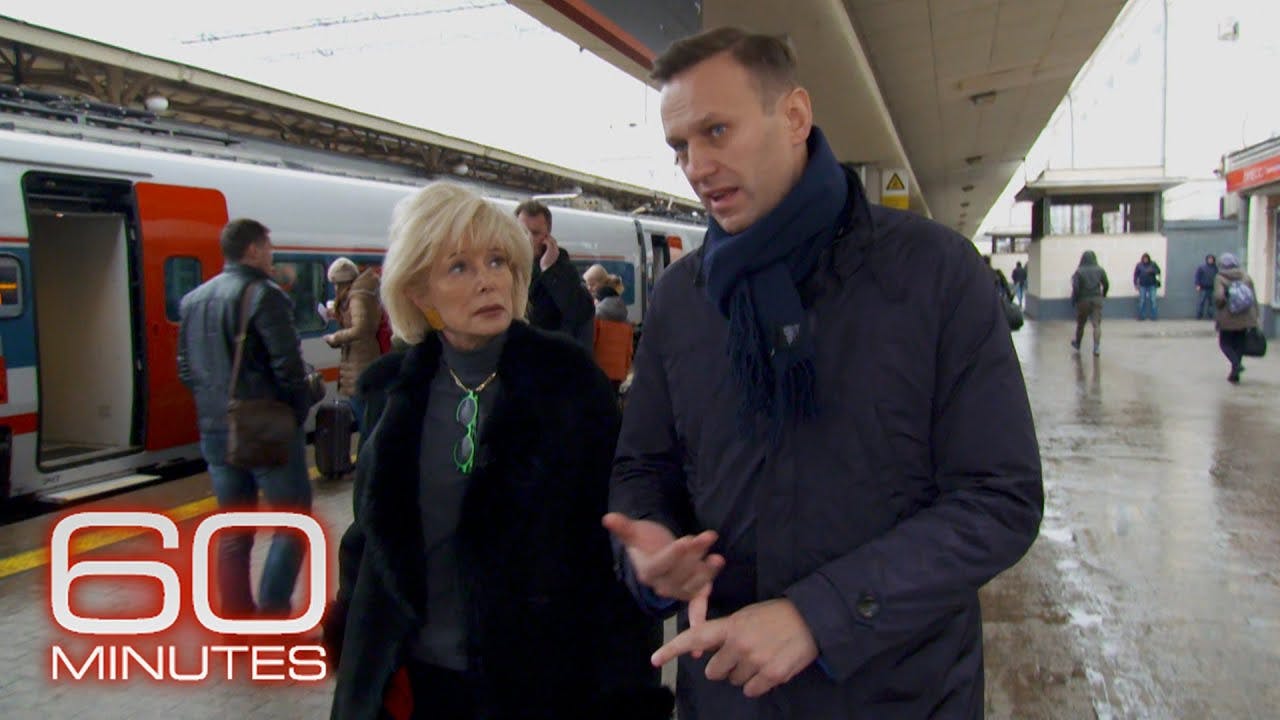Alexey Navalny and Putin's history of suspected poisonings and crackdowns | 60 Minutes Full Episodes
17 Feb 2024 (over 1 year ago)

Alexey Navalny's 2020 60 Minutes interview (11s)
- Russian opposition leader Alexei Navalny was poisoned with the nerve agent Novichok while on a flight from Siberia to Moscow in 2020.
- Labs in France and Sweden confirmed the presence of Novichok in Navalny's blood and on a water bottle from his hotel room.
- Navalny's wife, Yulia, launched a public campaign to encourage Western diplomatic pressure on Russia to release him.
- Germany and France have imposed sanctions on Russia over the poisoning, but the United States, under President Donald Trump, did not.
- Navalny believes that President Vladimir Putin is responsible for his poisoning and sees it as an attempt to silence him and suppress dissent.
- Despite the risks, Navalny remains determined to return to Russia and continue his work against corruption and for democratic reforms.
Alexey Navalny's 2017 60 Minutes Interview (13m56s)
- Alexey Navalny is a 41-year-old lawyer and opposition leader in Russia who has been challenging President Vladimir Putin in the upcoming presidential election.
- Navalny has been critical of Putin's government, accusing him of corruption and stealing the country's future.
- Despite facing numerous arrests and legal challenges, Navalny has continued to gain popularity and support from Russian citizens, particularly through social media and YouTube, where he has millions of followers.
- Navalny has exposed corruption within the Kremlin's inner circle by publishing financial documents and airing documentaries on YouTube, including one about Prime Minister Dimitri Medvedev's lavish estates.
- Navalny's anti-corruption efforts have led to large-scale protests in Russia, with tens of thousands of people taking to the streets in support of him.
- Putin has responded to Navalny's challenge by cracking down on dissent, arresting protesters and opposition figures, and tightening control over the media.
- Navalny has survived several attempts on his life, including being poisoned with Novichok, a military-grade nerve agent, in 2020.
- Navalny's political platform includes increased spending on education and healthcare, restoring freedom of the press, and taxing the oligarchs.
- Putin has never mentioned Navalny's name publicly, leading to speculation that it may be a superstition or a way to avoid giving him more attention.
- Navalny believes that Putin fears him because of his ability to draw crowds and mobilize people.
- Navalny is a Russian opposition leader and anti-corruption activist who has been a vocal critic of President Vladimir Putin.
- Putin's government has been accused of being behind the poisonings and crackdowns on Navalny and other opposition figures.
Poisoned (26m36s)
- Vladimir Kara-Murza, a prominent Russian opposition activist, was severely poisoned in 2015 and again in 2017.
- He believes the poisonings were deliberate due to his criticism of the Russian government and his collaboration with Bill Browder, an outspoken critic of Putin's regime.
- Kara-Murza and Browder successfully lobbied for the passing of the Magnitsky Act, which sanctions individuals responsible for human rights violations in Russia.
- Putin's anger towards the Magnitsky Act is seen as a possible motive for targeting Kara-Murza.
- Several individuals connected to the Magnitsky case, including Boris Nemtsov, have been killed or died under suspicious circumstances.
- Many of Putin's political opponents, human rights lawyers, and journalists have faced untimely deaths, including Anna Politkovskaya, who was poisoned and shot.
- Mikhail Khodorkovsky, once Russia's richest man, was imprisoned after opposing Putin and now funds a pro-democracy movement from London.
- Kara-Murza, a senior organizer for Khodorkovsky's movement, has survived two suspected poisonings and continues his opposition work despite threats.
- The Kremlin denies any involvement in the poisonings, but Kara-Murza believes they were an attempt to silence him and other opposition voices in Russia.